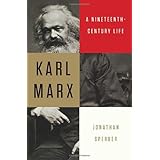Third Book of the Summer

Karl Marx: A Nineteenth Century Life
by Jonathan Sperber
I have had this book on my to-read list ever since it came out. I was not disappointed. However, it is driving me crazy that so many things I say and teach about Karl Marx and Marxism need to be amended now. For one, Marx’s radicalism needs to be very closely tied to the 1848 revolutions, something I don’t do. For another, the way I teach Marxism as a fully formed late nineteenth century ideology is a bit premature.
Though this book is over 500 pages long, it is a perfect demonstration of historical thinking, particularly historical perspective. The entire point of the book is to interpret Marx in the light of his own times, not in the rear view mirror of twentieth century communism. Doing so really changes one’s impressions of Marxism as an ideology. Marx was not at all sure what a communist society would like, and, in fact, he didn’t even like to speculate about it.
This is yet another book in a long line I have read about characters who are not personally likeable but who are historically significant: Lenin, Trotsky, Stalin, now Marx. For me, Lenin and Marx get higher marks for their personal characteristics. Marx, it turns out, was a loving husband and father, though he did father a child with the household servant. While he had many quirks and held many of the prejudices of the time, he was committed to his writing and espousal of revolutionary viewpoints. The reader feels sorry for his health problems and loss of multiple children.
The one thing that puzzled me most throughout the book was that I could never get the connection I was looking for between Marx and the proletariat. It was made utterly clear that Marx was basically a bourgeois intellectual who had little contact with real industrial workers, though his colleague, supporter and main source of funding, Engels, certainly did with his ownership of a cotton mill in Manchester.
This book makes me want to read a biography of Engels. He comes across as somewhat of a hero for his financial support of Marx.The two were very close friends. Essentially there would be no Marxism without Engels’ attempts to get the works of his friend known after his death. It turns out that I have been right all these years in insisting that my students refer to both “Marx and Engels.”
Because historical context is so crucial in Sperber’s interpretation of Marx, it needs to be said that to understand this book one needs a good grounding in European history. Marx essentially based his concept of revolutions on the French Revolutions, plural because of the fact that the moderate revolution of 1789 was of course followed by a more radical one a few years later. Readers must understand the Napoleonic Code to see its effects on the part of ‘Germany’ where Marx grew up, the Rhineland. Then there are the revolutions of 1848, the Franco-Prussian War, the Reform Act of 1867 in Britain, Italian nationalism, all events and movements that served as backdrops for Marx’s ideas.
I don’t want to sound too Eurocentric, but I’m not ready to drop a lot of the European history from my grade 12 course. Though we’re still waiting for the new curriculum to be released, I anticipate that it is moving toward world history and away from European history. I am already feeling nostalgic for “The West and the World.”
At times it was difficult to read the biography, laced as it was with Hegelian philosophy and political economy. At other times it was surprising to read about Marx, this supposed icon of communism, as the proper Victorian man. In the end I feel more grounded in nineteenth century history. Rarely have I felt so accomplished after reading a book.